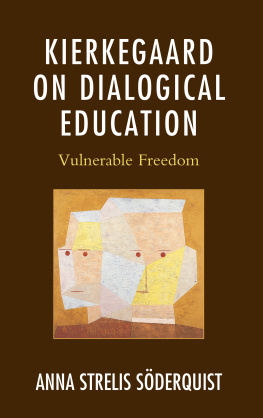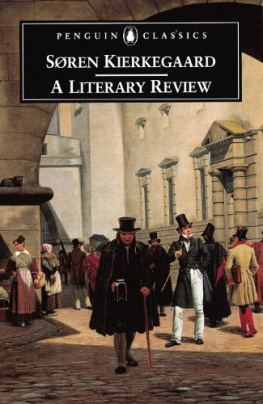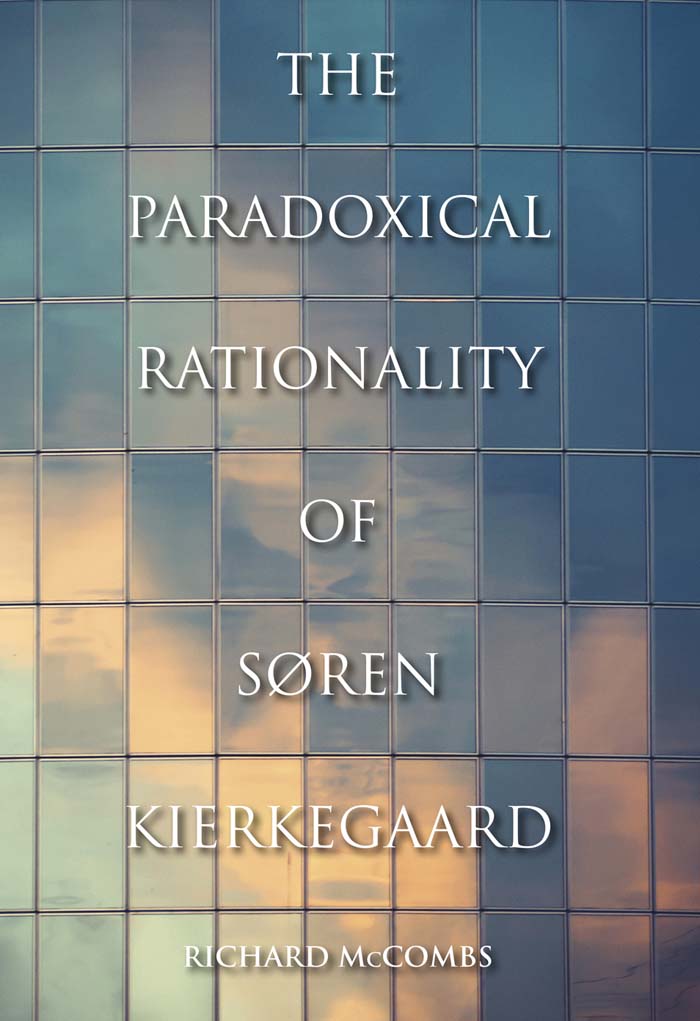THE PARADOXICAL RATIONALITY OF
SREN KIERKEGAARD
INDIANA SERIES IN THE
PHILOSOPHY OF RELIGION
Merold Westphal, editor
THE
PARADOXICAL
RATIONALITY
OF
SREN
KIERKEGAARD
RICHARD McCOMBS
Indiana University Press
Bloomington & Indianapolis
This book is a publication of
Indiana University Press
601 North Morton Street
Bloomington, Indiana 47404-3797 USA
iupress.indiana.edu
Telephone orders 800-842-6796
Fax orders 812-855-7931
2013 by Richard McCombs
All rights reserved
No part of this book may be reproduced or utilized in any form or by any means, electronic or mechanical, including photocopying and recording, or by any information storage and retrieval system, without permission in writing from the publisher. The Association of American University Presses Resolution on Permissions constitutes the only exception to this prohibition.
 The paper used in this publication meets the minimum requirements of the American National Standard for Information SciencesPermanence of Paper for Printed Library Materials, ANSI Z39.48-1992.
The paper used in this publication meets the minimum requirements of the American National Standard for Information SciencesPermanence of Paper for Printed Library Materials, ANSI Z39.48-1992.
Manufactured in the
United States of America
Library of Congress
Cataloging-in-Publication Data
McCombs, Richard Phillip.
The paradoxical rationality of Sren
Kierkegaard / Richard McCombs.
pages cm. (Indiana series in the philosophy of religion)
Includes bibliographical references
(pages) and index.
ISBN 978-0-253-00647-9 (cloth : alk.
paper) ISBN 978-0-253-00657-8
(electronic book) 1. Kierkegaard, Sren,
18131855. 2. Faith and reason
Christianity. 3. Philosophical theology.
I. Title.
BX4827.K5M33 2013
198'.9dc23
2012039961
1 2 3 4 5 18 17 16 15 14 13
TO MY PARENTS
RICHARD AND SANDRA MCCOMBS
CONTENTS
ACKNOWLEDGMENTS
Many people gave helpful criticisms and suggestions on drafts of this book. Jim Carey minutely critiqued an early draft. James Cutsinger gave helpful suggestions on parts of the manuscript and, more importantly, helped me with superlative Socratic art to learn a way of reading and thinking that led to the writing of this book. John Cornell, Joseph Smith, Steven Taylor, and Llyd Wells read portions of the manuscript and gave useful advice and criticisms. Sandra McCombs proofread the last draft and pointed out many errors. Walter Sterling read all of the manuscript and gave excellent advice both on the organization of the book as a whole and on the beginning of the book in particular. Merold Westphal, my mentor on Kierkegaard, gave very valuable advice on the manuscript as a whole and also made crucial suggestions on additions to the manuscript. Finally, my wife, Acacia, read the entire manuscript once, and many parts of it several times, and discovered many obscurities, inconsistencies of voice, and infelicities of style, and, more importantly, patiently supported and encouraged me in the writing of this book. Of course, any remaining errors in the text are to be attributed to its author.
ABBREVIATIONS
CA | The Concept of Anxiety |
CD | Christian Discourses, Etc. |
CI | The Concept of Irony |
COR | The Corsair Affair and Articles Related to the Writings |
CUP | Concluding Unscientific Postscript |
EBD | Early Buddhist Discourses |
EO, 1 | Either/Or |
EO, 2 |
EUD | Eighteen Upbuilding Discourses |
FPOSL | From the Papers of One Still Living |
FSE | For Self-Examination |
FT | Fear and Trembling |
JC | Johannes Climacus or De omnibus dubitandum est |
JFY | Judge for Yourself! |
JP | Sren Kierkegaards Journals and Papers |
M | The Moment and Late Writings |
MLD | The Teachings of the Buddha, the Middle Length Discourses of the Buddha |
PC | Practice in Christianity |
PF | Philosophical Fragments |
PV | The Point of View for My Work as an Author |
R | Repetition |
SLW | Stages on Lifes Way |
SUD | The Sickness unto Death |
TA | Two Ages |
UDVS | Upbuilding Discourses in Various Spirits |
WA | Without Authority |
WL | Works of Love |
THE PARADOXICAL RATIONALITY
OF SREN KIERKEGAARD
ONE
A Pretense of Irrationalism
Be ready always to give an answer to every man that asks you a reason for the hope that is in you. (1 Peter 3:15)
The noble lie [is] useful to human beings as a sort of remedy. (Republic 414c, 389b)
What I have wanted has been to contribute... to bringing, if possible, into these incomplete lives as we lead them a little more truth. (PV, 17)
The truth must never become an object of pity; serve it as long as you can, to the best of your ability with unconditioned recklessness; squander everything in its service. (PV, 211)
Temporarily suppressing something precisely in order that the true can become more true... is a plain duty to the truth and is part and parcel of a persons responsibility to God for the reflection [thinking capacity, reason] granted to him. (PV, 89)
[Sometimes the wise teacher] thinks it most appropriate to say that he does not understand something that he really does understand. (PV, 49)
One can deceive a person out of what is true, andto recall old Socratesone can deceive a person into what is true. (PV, 53)
This was sometime a paradox, but now the time gives it proof. (Shakespeare, Hamlet)
In his own colorful words, he is a spy in the service of the truth with the absurd or irrational as his incognito (CUP, 467; PV, 72; FT, 34; CUP, 500).
Kierkegaards strategy of feigning irrationality in the service of reason has both divine and human models and is grounded in both faith and reason. The divine prototype is the incarnation of God in the man Jesus Christ. As God humbled himself to become an individual human being so that individual human beings might become divine, so Kierkegaard humbles himself to appear irrational so that his readers might become (more) rational. Whereas the incarnation is the absolute paradox, because it transcends reason and therefore cannot be explained, comprehended, or demonstrated, Kierkegaards serving reason by seeming unreasonable is only a relative paradox, because it initially seems absurd, but can be explained, understood, and justified.
The human model for Kierkegaards incognito of irrationalism is Socrates. If Socrates ironically feigned ignorance in the service of knowledge, Kierkegaard goes further and ironically feigns irrationality in the service of reason. Rarely has any thinker conceded so much with an











 The paper used in this publication meets the minimum requirements of the American National Standard for Information SciencesPermanence of Paper for Printed Library Materials, ANSI Z39.48-1992.
The paper used in this publication meets the minimum requirements of the American National Standard for Information SciencesPermanence of Paper for Printed Library Materials, ANSI Z39.48-1992.